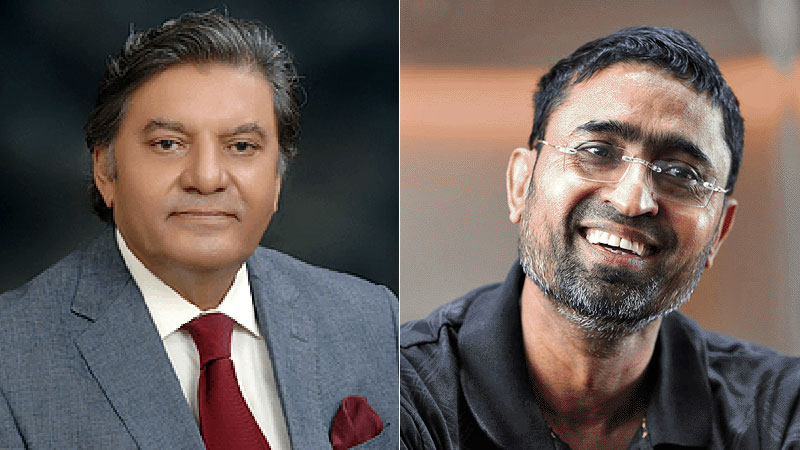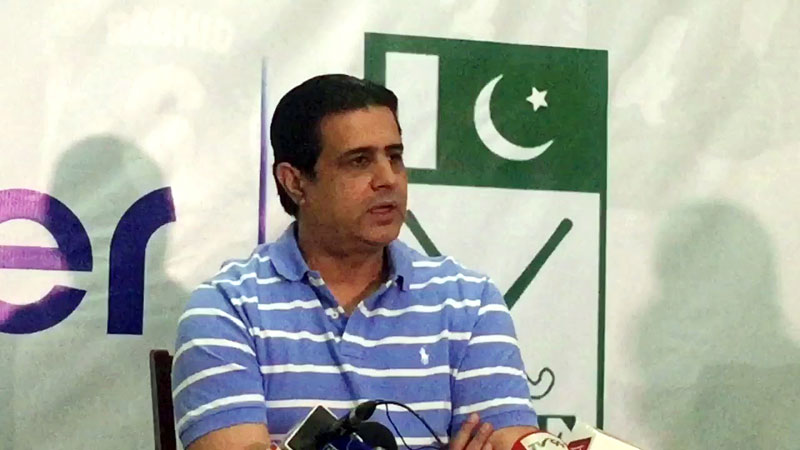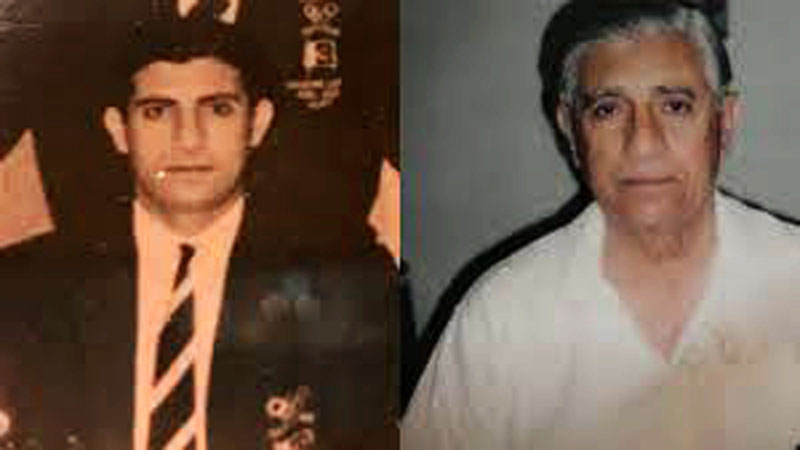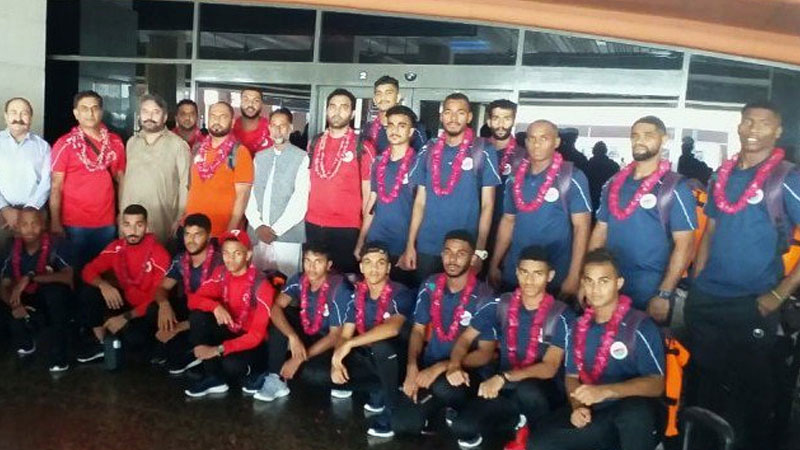News for 30 December 2019
All the news for Monday 30 December 2019
Indian hockey in 2019: Tickets to Tokyo, important highs for men and women
Both teams had a reasonably successful year under their respective coaches, the highlight being their entry into the Olympics.
Uthra Ganesan
Sjoerd Marijne (left) brought the full weight of his experience as a motivational speaker to work on the mental toughness of the women's team. - FIH
In a year when top-ranked teams were busy fighting it out in the Pro League and amping up their game against the toughest opponents, the highlight for the Indian men and women’s hockey teams was booking the all-important ticket to the 2020 Tokyo Olympics.
Having decided against being part of the elite nine-nation competition — eight for the men after Pakistan pulled out — the Indian teams had to make do with lower-ranked opponents in the first half of 2019 but came out victorious in the few events that mattered. And none more than the Olympic Qualifiers in November, hosted at the Kalinga Stadium in Bhubaneswar, a city that has become the virtual home of Indian hockey.
Rani to the rescue
While the men had an easy outing in the two-leg Qualifiers against a much-weaker Russia that, nevertheless, did expose a few chinks in the Indian armour, the women sealed their Tokyo spot in dramatic fashion, led by captain Rani Rampal, against USA. Taking a 5-0 lead in the first game, only to see the visitors wipe out the deficit in the first half itself in the second, it took a split-second shot from Rani to give the team the all-important winner even as the rest of the team rallied around her.
The wins managed to soothe the wound the teams had been carrying since the disappointment at 2018 Asian Games. There were other highs as well for the men — win at Hockey Series Finals, runner-up at Sultan Azlan Shah Cup after going down to South Korea in the shootout and the Olympic Test Event in Tokyo that gave the team crucial first-hand experience of the venue, conditions and surface that they would face seven months from now.
An additional challenge for the players was getting used to coach Graham Reid’s style. The Australian, a former assistant to the legendary Ric Charlesworth when the Kookaburras ruled world hockey and who led them at Rio Olympics, took charge just before the men travelled to Australia and only had a few months to find his best combination for the qualifiers. Assisted by analytical coach Chris Ciriello whom he worked with as a player, Reid managed to find the sweet spot between youth and experience.
On the upgrade
It was a different battle for Sjoerd Marijne and his women. The Dutchman, appointed in 2017 and shunted to the men’s team midway before being moved back to lead the women in 2018, made sure the team went from strength to strength through the year, both physically and mentally.
Working with scientific advisor Wayne Lombard — credited unanimously by the girls for their vastly improved fitness, strength and stamina — Marijne brought the full weight of his experience as a motivational speaker to work on the mental toughness of the team. Unafraid to use psychological aids to understand them better, Marijne began with a winning series against Spain and Ireland that laid the template ahead of the Series Finals in Hiroshima. The women exacted revenge for the final defeat to Japan at Asiad and gathered enough points to ensure they played the Qualifiers at home. It made all the difference.
The juniors (both men and women), too, did well enough to merit attention. While the men began with a disastrous outing at the 8-Nations tournament in Spain — a tournament that saw chief coach Jude Felix being summarily dismissed, a vacancy that remains unfilled — they made up with a runner-up finish at the Sultan of Johor Cup.
The women, meanwhile, won the 3-Nations Tournament in Canberra towards year-end. The team also won the Cantor Fitzgerald U21 International 4-Nations Tournament, registering 10 wins and two draws in the 16 matches they played.
Sportstar
2019 — Pakistan hockey’s Annus Horriblis
Muhammad Ali
The year 2019 proved to be Pakistan hockey’s Annus Horriblis. The year will go down as one of another darkest chapter in the history of Pakistan hockey. Pakistan’s failure to qualify for the second successive Olympics marks a calamitous new low. Worryingly, there is little to suggest that 2020 will be less challenging. The agonising reality is that Pakistan hockey has acquired a ‘loser’ image in world hockey and become a synonym for defeat, mediocrity and failure. It is now the Sick Man of global hockey and it’s incorrigible and confirmed Pauper. It has reached its nadir. After their failure to make the grade in the Rio Olympic Games in 2016, the hopes that Pakistan harboured for the Tokyo Olympics 2020 were dashed in October 2019 when the Netherlands crushed them 6-1 in the second qualifier to confirm their berth at the Olympics 2020. Though Pakistan did show some spark in the first qualifier when they had held hosts Holland to a 4-4 draw, but the Green Shirts were no match in the second. The failure to qualify for the second Olympics in a row, perhaps, is the final nail in the coffin of Pakistan hockey.
Few international hockey teams have a history as storied as the Pakistan side. It is lamentable that a country who won Olympic gold thrice, World Cup four times (the most by any nation in the history of the sport), Asia Cup thrice, Asian Games gold record eight times, Asian Champions Trophy gold twice, FIH Champions Trophy gold thrice and remained unbeatable at regional level for many years ended the year as one of the lowest teams in the world: 17th in the world rankings. This means Pakistan cannot even directly qualify to play the final rounds of the World Cup and the Olympics. They have to play qualifying rounds to secure a place in the final rounds of these mega tournaments. Several teams which were trained and coached by Pakistan players, including China, South Korea, Japan and Malaysia, remained ahead of Pakistan in the world rankings. For anyone growing up watching hockey, few teams personified big-match temperament and swagger like Pakistan. Today, though, that swagger has faded, and the entire edifice on which Pakistan hockey rests, lies teetering on the edge.
Throughout the year it seemed as if was is not about winning anymore, it was all about losing gracefully and coming up with excuses. Whether or not they are ready to participate in the upcoming tough assignments of 2020, the Pakistan Hockey Federation (PHF) has surely accumulated a nice list of excuses for face-saving, should the nation question them when they fail at the international assignments.
Pakistan suspended for not participating in Pro League: The year started with shocking news when Pakistan was suspended from the 2019 FIH Pro League. The Pakistan Hockey Federation had informed the International Hockey Federation (FIH) that they won’t be able to play their scheduled first three games of the event. Pakistan had to play Argentina, Australia and New Zealand, but the PHF citied “inevitable circumstances” to the FIH for non-participation. As a result, the FIH suspended Pakistan from the event to avoid jeopardising the regularity and the smooth running of the event.
FIH imposes hefty fine on PHF: In April, the FIH imposed a hefty fine of 170,000 euros on the PHF for not honouring the Pro League commitments but the cash-strapped PHF said it was in no position to pay the penalty. The national federation requested the FIH to reduce the fine and allow it to be paid in installments. The request was accepted.
Uzbekistan hockey team in Pakistan: Also in April, Uzbekistan’s national hockey team toured Pakistan. The visitors played a series of matches against Pakistan development squad and other local teams.
Shahbaz Sr resigns, Asif Bajwa rejoins PHF: In May, former Olympian Asif Bajwa was appointed as PHF Secretary General replacing another ex-Olympian Shahbaz Ahmed Senior who resigned. Shahbaz had turned in his resignation in December 2018 as well after Pakistan’s dismal show at the World Cup in India where they finished 11th. In his resignation, he had cited government’s alleged apathy towards hockey and said that there was no infrastructure for hockey in the country. He had further said that the PHF had no asset or a system in place for the generation of funds. The PHF had turned down his resignation, however. It is pertinent to mention that new Secretary General Asif also held the same position from 2008 till 2013 with Qasim Zia as the national federation’s President. Though that period (2008-13) had also failed to bring any visible improvement in Pakistan hockey which had gradually declined since Pakistan’s memorable triumph at the 1994 World Cup.
Hockey icon Brig Hamidi passes away: On July 11, one of the icons of Pakistan hockey and 1960 Olympics gold medal winning team captain Brig (r) Abdul Hamid Hamidi breathed his last at Combined Military Hospital (CMH) in Rawalpindi, losing battle against lungs injury occurred due to sudden fall at home. He was 92. Hamidi was one name who played instrumental role in popularizing and strengthening the game of hockey in Pakistan. He represented Pakistan at four Olympics: –– 1948 in London, 1952 in Helsinki, 1956 in Melbourne and 1960 in Rome, winning gold and silver medals in the process. Hamidi also served as Director General of the Pakistan Sports Board besides heading the Army Sports Board. He also served as PHF Secretary General and was known as one of the pioneer game administrators.
Former Olympian Manzoor Junior becomes chief selector: In July, Manzoor Hussain Junior, 1984 Los Angeles Olympic Games gold medal-winning captain and strong critic, was named chief selector by the PHF. He became head of the four-member selection committee which also included Ayaz Mahmood, Waseem Feroz and Khalid Hameed, all Olympians. The former celebrity, who led an Olympian group and accused the PHF officials for setbacks in the last four years, succeeded the former Olympian Islahuddin Siddiqui-led committee whose term had expired.
Oman hockey team arrives to play four-match series: In the first week of October, a 33-member Oman hockey squad arrived in Pakistan to play a four-match series against the national development and rising squads. The visiting team were on a preparatory cum training tour of Pakistan to give final touches to their preparations for the Asia Confederation Hockey Cup in Dhaka, Bangladesh, which was the qualifying round of the Asian Hockey Cup. The first match was played on October 1 while the next three matches took place on October 2, October 4 and October 6.
Netherlands thrash Pakistan to seal Olympic berth: In the last week of October, Netherlands handed Pakistan a 6-1 thrashing in the second-qualifier after a 4-4 draw in the first-qualifier to earn berth for the 2020 Tokyo Olympics. Drag-flicker Mink van der Weerden hit a brace, while Bjorn Kellerman, Terrance Pieters and Jip Janssen added to the scoreline to take the aggregate to 6-0. Rizwan Ali grabbed a consolation for the opposition in the 53rd minute as Pakistan failed to qualify for the Olympics for the second time in a row. The Dutch, who looked hurt from conceding four goals the previous day, pinned Pakistan in their defensive circle and denied the Green Shirts any sort of space.
It is also very unfortunate that the PHF, over the years, has become politicised and nepotistic, just like its cricket counterpart. In the national sphere and the sporting arena the root of our dilemma is the notorious system of patronage and imposed cronies, to the exclusion of merit and professionalism. Under the powerful patron’s benevolent gaze, the pick and choose appointees can survive scandals and failures that would crush an ordinary mortal. These are times when one fails to figure out what is keeping Pakistan hockey alive. In other countries, the people running the hockey affairs contribute by taking professional decisions and by executing them with competence rather than on the basis of personal preference and bias. But, frankly, we are not such a nation. The statements given by the top PHF officials in the national media aim at to make people believe that the national outfits are doing well, and that there is light at the end of the tunnel. The fact is that the way things are being conducted, the days ahead are anything but that.
Not much hope in 2020:
Like previous years, the PHF remained unable to give maximum international exposure and facilities to senior as well as junior players. What more disturbing is that the crippling financial state of the sport has finally struck a killer blow to the country’s national game. Such has been the state of Pakistan hockey over the past two decades that it came as no shock to all and sundry when the team failed to qualify for the successive Olympics. For the mandarins who run the hockey show, though, the priorities lay elsewhere. The harsh truth is that the national sport has been reduced to a game of musical chairs, where the officials and former Olympians of yesteryear have taken turns to deprive hockey of both prestige and funds. At the same time, the country’s obsession with cricket and the government’s indifferent attitude have not helped as the corporate sector, and well-wishers have switched their loyalties to the gentleman’s game, the highly successful Pakistan Super League being a prime example, relegating the national sport to the background. The sport, for which the country was world-renowned, is now a picture of apathy. Spectator-less stadiums, declining numbers of players and a virtual media blackout are enough proof that the nation has lost interest in the sport.
It is also very unfortunate that the PHF, over the years, has become politicised and nepotistic, just like its cricket counterpart. In the national sphere and the sporting arena the root of our dilemma is the notorious system of patronage and imposed cronies, to the exclusion of merit and professionalism. Under the powerful patron’s benevolent gaze, the pick and choose appointees can survive scandals and failures that would crush an ordinary mortal. These are times when one fails to figure out what is keeping Pakistan hockey alive. In other countries, the people running the hockey affairs contribute by taking professional decisions and by executing them with competence rather than on the basis of personal preference and bias. But, frankly, we are not such a nation. The statements given by the top PHF officials in the national media aim at to make people believe that the national outfits are doing well, and that there is light at the end of the tunnel. The fact is that the way things are being conducted, the days ahead are anything but that.
Pakistan hockey, which remained up in the clouds for more than three decades, is not the same force that it used to be. Pakistan hockey structure lacks in terms of skills and competitiveness. The very base of the game has shrunk beyond belief. Pakistan hockey’s slump is not quite as dramatic or sudden as it now seems to be. It’s been a slow and painful decline that began after 1994. Cricket, with better financial rewards and glamour, slowly replaced hockey in schools and colleges. For the last two decades, the government has done nothing seriously for promotion of the national sport of the country but wants results. What a pity. To remain consistent, Pakistan hockey needs improvement all over at every tier of the game at the domestic level to show an upward graph.
The decline of Pakistan hockey also coincides with the advent of artificial turf that gained currency in the late 1970s and early 1980s. It changed the dynamics of Asian hockey, rendering the dribble-and-dodge game of short passes that Indians and Pakistanis were so good at completely obsolete. It also cut the careers of players by half, and demanded greater physical fitness than before. The Asians have not been able to match the fitness levels of Western players. Also, the FIH has over the decades changed some basic rules of the game that the Asians had mastered in their heyday. This also has proved to be a disadvantage.
Building a strong team is not an overnight process and it takes years to put together a balanced side keeping in view the modern approach to competitive international hockey, and the exacting scientific preparations that the international teams now favour. The standard of the game is changing so rapidly that the gap between the best and the second in line has narrowed considerably. In fact, the difference between the four top teams has become so small that whenever any two of them meet it is very difficult to predict the outcome of the game. Failure to qualify for the Olympics is the most forgetful incident for Pakistan hockey. What is worse, Pakistan hockey seems to be on an irrevocable downward slide. And realistically speaking, one should not harbour any hopes of the national team doing any better or revive itself to its former glory in coming years with the cronies running the show and incapable officials handling the affairs of the national sport of the country.
On the other hand, our neighbour India in recent years has taken a giant leap in promoting its sports, injecting millions of dollars into cricket, hockey, badminton, tennis, football and kabaddi. They have started staging international leagues attracting world-class players. All this is helping India tremendously to elevate itself in the international sports arena. Unfortunately, the situation in Pakistan is exactly the opposite as the federal government lacks the required level of interest to involve the nation in sporting activities. Instead the Pakistan government is more interested in squandering billions of rupees on worthless projects.
To rise above again, Pakistan hockey requires strong financial backup, commitment and self-belief. Only hard and incessant efforts lead to success. Only then the elusive triumphs will replace the current tragedies that demean the team once basking in Olympic golds and world crowns. In the absence of these, we should not dream of reaching skies. The future of hockey in Pakistan heavily depends on paying attention to grassroots hockey. Pakistan had been a fantastic hockey nation for decades and ruled at international level by virtue of their talent and skills and now they are struggling to make their mark at the highest level of the game and they should pay attention to their grassroots level in order to broaden the base of the game. Pakistan hockey needs adequate hockey activities at early level which is only possible by evolving a system which could ensure that hockey gets due attention among the youth. It is so painful that country’s national sport, having so much pride and passion, has gone to the dogs.
The Daily Times
Top-scoring defender Nur Aisyah out to put rivals in a corner
By AFTAR SINGH
KUALA LUMPUR: Defender Nur Aisyah Yaacob converted eight penalty corners to help Malaysia win their first women’s indoor hockey gold in the recent Philippines SEA Games.
The Melaka player, who was the top scorer for Malaysia in the SEA Games, wants to continue doing the same in the Malaysia Hockey League (MHL), which begins on Jan 10.
The 23-year-old, who is pursuing a degree in mechanical engineering at Universiti Tenaga Nasional (Uniten), will be featuring for PKS-Uniten for the fifth season in the MHL.
Nur Aisyah was out of action for more than two years but national women’s coach K. Dharmaraj provided her a lifeline by calling her up for training with the national women’s indoor hockey team in October.
She scored seven goals to steer Malaysia to win the five-nation Tuanku Zara invitational international women’s indoor hockey tournament in Kuala Kangsar last month.
Nur Aisyah also played for Malaysia in the 2017 SEA Games and Malaysia won the bronze medal in indoor hockey.
“The PKS-Uniten team will be banking on me to handle the defence and also to deliver goals in the MHL.
“But converting penalty corners in indoor hockey is different than in field hockey. I am working on my execution of penalty corners for the MHL. I am also feeling the pressure as I will be the number one penalty corner drag flicker for Uniten in the absence of national player Nuraini (Abdul Rashid), who joined another club in the league for 2020, ” said Nur Aisyah, who failed to score a single goal for PKS-Uniten in the 2019 season.
Defender Nuraini, who scored eight goals for Uniten this season, has joined Hockey Academy of Kuala Lumpur.
“I am still young and I definitely want to play for the national field hockey team.
“My performance in the MHL will be important to impress the national selectors, ” said Nur Aisyah.
Six teams will feature in the women’s league. The other teams in the fray are Terengganu Ladies team, Blue Warriors, Mutiara Impian-MSSPP-PSHA, Sabah and Hockey Academy of KL.
The Star of Malaysia
UniKL coach: Team effort wins titles
PETALING JAYA: Getting to the top is tough. Staying there is tougher. Universiti Kuala Lumpur’s (UniKL) coach Arul Selvaraj is well aware of that.
The coach of the Malaysia Hockey League (MHL) champions knows that every team around will be out to knock them off their perch.
UniKL captured the MHL title for the first time since making their debut in the competition in 2011 and they did it in style by finishing their campaign unbeaten.
Arul said his men have to be more careful in their title defence as their opponents will throw everything they have at them.
“As the saying goes... it’s always easier to win a championship than defend it. I’m sure every team will have extra motivation to beat us, ” said the former international.
“We just have to be smarter about how we manage each moment in the game. We have the players who know and understand how to deal with this moments.”
“We are very happy with the team that we have assembled... as the games are played, we will rectify and improve till the last match of MHL 2020. We have David Harte who is one of the best goalkeepers in the world... he gives us confidence to go forward and attack.”
Besides retaining defender Tim Deavin of Australia and Irish goalkeeper Harte from last season, the team have also signed strikers Roel Bovendeert of Holland and Australian Kieran Govers.
UniKL will begin their title defence against overall champions Terengganu in the MHL Charity Shield match on Jan 10.
Terengganu, under new coach K. Dharmaraj, will be powered by South Korean imports Jang Jong-hyun and Jung Man-jae besides two Pakistanis in Shakeel Abbasi and Umar Bhutta.
“The Charity Shield is crucial as it also acts as the first league match. We want to start well.
“I don’t plan the outcome of the match, that’s beyond my control but I control what should be done tactically. I require my players to play at the moment... we will plan well to perform as a team.
“My philosophy is: we need a team effort to win the title. Of course, you have some magicians in the team who are match winners but ultimately, individuals can only win matches. Team effort wins titles.”
The Star of Malaysia